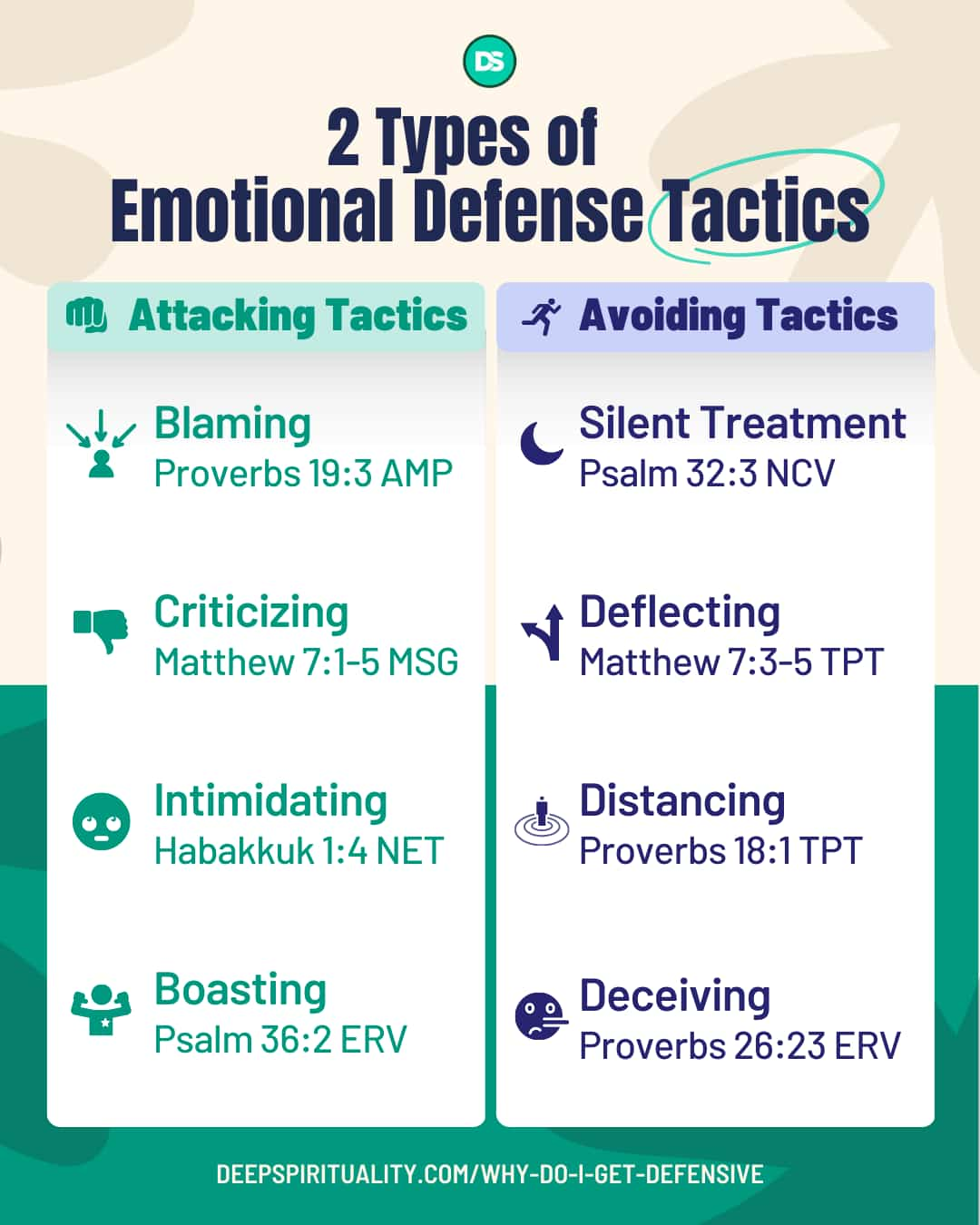Table of Contents
If you’re interested in this topic, there’s more where it came from! This article is based off of content from our book, He’s Not Who You Think He Is: Dropping Your Assumptions and Discovering God for Yourself, which will be released on April 24. Sign up here to get alerted when the book is available for purchase.
This week, I was defensive.
I could feel it happening. A friend said something to me that was completely justifiable, but I disagreed with it and took it personally.
The limbic system of my brain took over: I could choose fight or flight, and I went with fight. My posture changed, my face tensed, my blood pressure jumped up, and I shot back a retort that I could see put him on his heels. I could also see that my angry and defensive reaction hurt the relationship. I felt bad, apologized, and we rectified things.
I wish I could say that this was the only time I responded that way and that it will never happen again, but I don’t think that’s true. I am working to change this part of my character, but let’s just say it’s a work in progress.
Why we need to understand our defensiveness
They live in constant terror, always with their backs up against the wall because they insist on shaking their fists at God, defying God Almighty to his face, Always and ever at odds with God, always on the defensive.
Job 15:25-26 MSG
Though Job’s friends were not always the most helpful to him, we can still learn from their words recorded in the Bible. Here, his friend Eliphaz accurately describes the unspoken motivator deep inside a defensive heart: fear.
When we are afraid of being hurt, rejected, or misunderstood, we’ll feel the need to protect our hearts and emotions at all times. Any piece of perceived criticism or injustice will make us feel like our backs are up against a wall and pain is incoming, so we’ll start swinging. As we try not to get hurt, we can hurt those around us without realizing it or intending to.
In our desperate need to protect ourselves, we make ourselves at odds with God and people. We might think that our anger and pride are the only tools we have to keep us from getting overly anxious or overwhelmed, but in reality they cause us more stress because they make us handle life alone. The truth is we need God and friends to help us, no matter how scary that might feel at first.
Like the title of Michale Olpin and Sam Bracken’s book about breaking free from stress so accurately explains, we need to “unwind before we unravel.” In other words, we need to understand why our hearts get angry and defensive before they make us fall apart.
With this in mind, I studied some scriptures to help me understand what’s behind my anger and defensiveness. This Bible study has helped me to not only understand myself better but also build trust in my relationship with God. Trusting God helps me lower my defenses and listen to him as he helps me become the person I’m meant to be.
In this devotional, we’ll examine the root causes and tactics of emotional defensiveness, followed by ways we can learn to rebuild our trust in God and the friendships God provides us. Let’s get started!
The root causes of emotional defensiveness
Return home, my daughters; I am too old to have another husband. Even if I thought there was still hope for me— even if I had a husband tonight and then gave birth to sons—would you wait until they grew up? Would you remain unmarried for them? No, my daughters. It is more bitter for me than for you, because the Lord’s hand has gone out against me!”
Ruth 1:12-13 NIV
The book of Ruth tells us a story of a woman named Naomi and her daughter-in-law Ruth. Naomi had experienced intense pain in her life. After losing her husband and both of her sons, she felt as if God was against her. Even when her daughters-in-law tried to show her she wasn’t alone, she could not (or maybe refused) to see anything other than her own hurt and bitterness.
In an upcoming book He’s Not Who You Think He Is: Dropping Your Assumptions and Discovering God for Yourself, author and Deep Spirituality Editor-in-Chief, Russ Ewell, discusses the cause of the emotional defensiveness that Naomi seemed to be experiencing:
We become emotionally defensive when we feel hurt by God or someone else. This is the condition in which Naomi found herself when she spoke the words recorded in Ruth 1:12–13. After losing her husband and sons, she didn’t want to make any more emotional connections. This is exactly how we feel when we have experienced a great deal of pain.
He’s Not Who You Think He Is: Dropping Your Assumptions and Discovering God for Yourself, Russ Ewell
Emotionally defensive people like myself don’t necessarily want to push everyone away. It is not just that we are big jerks (although that can also be true), it is usually that we are trying to handle hurt and pain in a way that’s unhealthy. That pain could be the pain of grief, as Naomi was experiencing, or it could be the pain of rejection, abandonment, or discouragement.
Deep discouragement has a way of making us shut off and not listen because we don’t want to hope anymore. Long before Naomi’s time, a different set of Israelites experienced this kind of discouragement when they were enslaved in Egypt. They were so discouraged that they wouldn’t listen to Moses’ encouraging promises from God to set them free:
So Moses told the people of Israel what the LORD had said, but they refused to listen anymore. They had become too discouraged by the brutality of their slavery.
Exodus 6:9 NLT
There are so many things that can discourage us and rob us of faith. Just this last week my friends and I were discussing the challenges of the sandwich generation, in which parents aged 35-54 care for both young kids and aging parents. And while men and women are equally likely to be in this generation, research says that mothers tend to carry more extreme stress as a result of this life stage. That prolonged stress can turn into fatigue and discouragement. We can be so exhausted by it that we become defensive, not wanting to hear anything else we need to do or any ways we can be better.
When we are stuck trying to protect ourselves from further pain, we need someone to help us restore our trust in relationships with God and people. Naomi had just such a friend in her daughter-in-law, Ruth.
At this they wept aloud again. Then Orpah kissed her mother-in-law good-bye, but Ruth clung to her. “Look,” said Naomi, “your sister-in-law is going back to her people and her gods. Go back with her.” But Ruth replied, “Don’t urge me to leave you or to turn back from you. Where you go I will go, and where you stay I will stay. Your people will be my people and your God my God. Where you die I will die, and there I will be buried. May the Lord deal with me, be it ever so severely, if anything but death separates you and me.” When Naomi realized that Ruth was determined to go with her, she stopped urging her.
Ruth 1:14-18 NIV
I am grateful for my wife and the friends in my life who have not allowed my defensiveness to drive them away. Like Ruth did for Naomi, these friends have looked past my defenses and stayed with me in difficult times. They have given me a chance to catch my breath and refocus on restoring my trust in my relationship with God rather than staying in my bitterness.
Pause and reflect
- What hurts and pains have left you emotionally defensive?
- Is deep discouragement a factor in your life right now? How is it affecting your relationship with God and people?
- Who are some friends who can help you restore your trust in your relationship with God?
The tactics of the emotionally defensive
Defensiveness doesn’t always look like arguing or yelling. It can take many different forms, from blaming to criticizing to giving the silent treatment. I call these forms of defensiveness “defense tactics,” or things we do to protect ourselves when we’re afraid of pain.
Identifying our defense tactics is important because we can’t change them if we don’t see them. Learning to recognize the signs that we are being defensive enables us to slow down and deal with the underlying causes in the previous section.
Let’s learn why our defense tactics matter from a famously self-protective guy in the Bible named Jonah.
God: Do you have any good reason to be angry about this gourd’s vine?
Jonah: Yes, I do. I’m angry enough to die.
Jonah 4:9 Voice
I have always both laughed at and been struck by Jonah’s angry response to God. God had a gourd vine grow up, and it provided shade for Jonah. When the vine withered and no longer provided shade, Jonah was angry.
God asked a good question for angry people: “Do you have any good reason to be angry?” Angry people always feel like they have many good reasons to be angry. Just ask for one of them, and they will delineate every injustice for you in painstaking detail.
Prior to this interaction, God had told Jonah to warn the Ninevites, a notoriously corrupt and evil people, to change. Once they actually did change, Jonah was angry that God didn’t strike them down. The lesson God wanted Jonah to learn through the vine was that in his anger, Jonah had lost a heart of compassion. He cared more about the inconveniences in his life than he did about others’ hearts and lives.
The problem with the tactics I use when I am defensive is that they all serve to protect me, but have nothing to do with love and compassion.
There are two types of tactics for emotionally defensive people: attack and avoid.

When we understand the tactics of the emotionally defensive, we can not only learn how to change ourselves when we use them, but also help our friends change when they’re being emotionally defensive.
Pause and reflect
- What are the ways you justify your anger?
- What are the tactics you use to be emotionally defensive?
How to restore trust with God and friends
The word of the LORD is correct, and everything he does is trustworthy.
Psalm 33:4 GW
To restore my trust in God, I have to remember what the Bible says about him: everything he does is trustworthy. He is always looking out for my best interests, so I don’t need to mistrustfully defend or protect myself.
So, what does all this mean? If God has determined to stand with us, tell me, who then could ever stand against us? For God has proved his love by giving us his greatest treasure, the gift of his Son. And since God freely offered him up as the sacrifice for us all, he certainly won’t withhold from us anything else he has to give.
Romans 8:31-32 TPT
My emotional defensiveness melts away when I remember who God is and what he did for me when Jesus died on the cross. The fact that God not only gave up his son for me, but also wants to continue to give me good things throughout my life, proves that he is a better defender of my life and heart than I am. I don’t have to defend myself when I realize that God is already defending me.
My God is my rock. I can run to him for safety. He is my shield and my saving strength, my defender and my place of safety. The LORD saves me from those who want to harm me.
2 Samuel 22:3 NCV
So we are convinced that every detail of our lives is continually woven together to fit into God’s perfect plan of bringing good into our lives, for we are his lovers who have been called to fulfill his designed purpose.
Romans 8:28 TPT
I have heard these passages of the Bible many times, but I don’t always meditate and pray about them until I really believe them. When I do, I realize that God is taking every detail of my life—the good, the bad, and the ugly—and weaving them together for good; no perceived injustice, slight, or criticism escapes his notice. They all serve his purpose. Rather than defending myself from them, I need to learn through them.
All praise to the God and Father of our Master, Jesus the Messiah! Father of all mercy! God of all healing counsel! He comes alongside us when we go through hard times, and before you know it, he brings us alongside someone else who is going through hard times so that we can be there for that person just as God was there for us. We have plenty of hard times that come from following the Messiah, but no more so than the good times of his healing comfort—we get a full measure of that, too.
2 Corinthians 1:3-5 MSG
When I believe that God is protecting me, my defensive walls fall with people, and I invite them into my life. I am starting to learn that the parts of life that are the most painful can also be the parts of life that bring me closest to God and my friends—as long as I am vulnerable. The only way to walk alongside God and each other is to trust God and each other enough to be vulnerable. That is what closeness is all about.
The goal of biblical relationships is always love and friendship (Hebrews 10:24-25), and vulnerability is the path. As renowned vulnerability expert Brene Brown says in her book Daring Greatly, “If we want greater clarity in our purpose or deeper and more meaningful spiritual lives, vulnerability is the path.” The most profound negative impact of my defensiveness is that it makes me unloving and pushes people out of my life and heart.
Loving relationships start with the decision to trust God and friends enough to be vulnerable and to share our authentic selves. Then, no matter where our journey leads, we will face it together, walking alongside God and friends.
Pause and reflect
- How much do you rely on God’s Word to relieve your defensiveness?
- What decisions can you make to be vulnerable with God and friends this week?
Take action
- Find passages of Scripture about God protecting you and defending you, and pray to truly believe them. Read them when you feel tempted to be defensive and remember that God has your back.
Final thoughts
Emotional defensiveness often comes from underlying pain, discouragement, or fear. Most of us don’t want to be emotionally defensive, but we tend to feel like it’s the only way to protect ourselves from pain. Unfortunately, we usually end up hurting the people we care about in the process.
God is a protector, and when we get to know him by reading the Bible we’ll be able to trust him and his plans for our lives. Our defensiveness will melt away, and we’ll find the courage to be vulnerable with God and the people around us.
Explore more:
Scott Colvin works in ministry and community service in the San Francisco Bay Area. Scott ran cross country for the University of North Carolina. Some say he's still running to this day.
Scott Colvin works in ministry and community service in the San Francisco Bay Area. Scott ran cross country for the University of North Carolina. Some say he's still running to this day.





